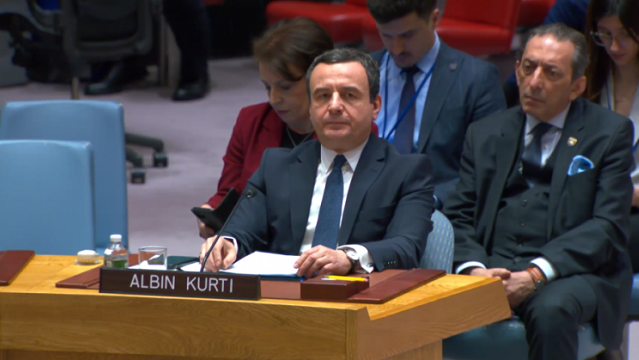By Daniel Serwer
Kosovo PM Kurti on the Banjska terrorist attacks:
— Admirim (@admirim) February 8, 2024
You noticed today that Mr. Vucic mentioned Serbs being wounded in different incidents but he did not mention 3 killed Serbs.
Why? Because he knows they were terrorists financed, supported, orchestrated by him. pic.twitter.com/0aMjLA5bAH
There is no exaggeration in what Albin is saying. President Vucic financed, supported, and orchestrated the terrorist attack of September 24. The Kosovo police the EU wanted (and continues to want) withdrawn from northern Kosovo responded professionally, killed three of the perpetrators, and prevented worse from happening. Washington and Brussels know this but won’t say it. They prefer to allow Vucic to get off scot-free.
They are likewise allowing him to avoid responsibility for the unfair national and fraudulent Belgrade elections of December 27. The European Parliament has called for a commission to investigate. But so far the European Commission, the Council, and most of the Member States are keeping their mouths shut about an election that wouldn’t pass muster in any EU country. It didn’t come close to the relatively free and fair elections in recent years in Kosovo, including two that installed Kurti in office.
See no evil, hear no evil, speak no evil
Why this “see no evil, hear no evil, speak no evil” approach to someone who is taking an EU candidate country into ever closer alignment with Russia and China? Many tell me the ammunition Serbia supplies to Ukraine is a factor. But Belgrade surely ships as much ordnance or other military supplies to Moscow as it does to Kyiv. It is unlikely Vucic would cut off Kyiv out of spite for Western criticism. Inat only goes so far when it is a question of profits for your arms manufacturer friends.
Support for “stability” is another possible explanation. But Vucic has no viable opposition, either on the liberal democratic side of Serbian politics or the ethnic nationalist side. Serbia’s problem is a lack of political competition, not an excess of it. He is the destabilizing force both in his country’s politics and in its relations with its neighbors.
The internationals are part of the problem
Lack of international political horsepower is another explanation. EU negotiator Miroslav Lajcak is exhausted and at the end of his rope. The dialogue he has led for more than three and a half years has played out. Belgrade has repeatedly and loudly renounced supposed “legally binding” agreements reached there. Yesterday he refused to sign them at the Security Council. Without real progress on de facto if not de jure recognition, Pristina refuses to create the Association of Serb-majority Municipalities that Lajcak and American negotiator Gabe Escobar unwisely made their top priority.
Many hope things will improve with Assistant Secretary of State O’Brien in charge. He has been appropriately blunt with the Bosnians. But it is not clear whether he is prepared to dial up the heat on Vucic about the Serbian elections, the dialogue with Pristina, Belgrade’s September 24 terrorist attack, or the kidnapping of three policemen on Kosovo territory. Jim recognizes the difficulty of any political settlement and tries to steer his efforts in the economic direction, hoping to flank the recognition issue.
So who cares?
None of this is a big problem, at least as seen from Washington or Brussels. But it isn’t a big problem until it is. Vucic is increasingly serious in his efforts to destabilize the neighboring countries with irredentist and self-victimizing claims on behalf of their Serb populations. The Russians will be pushing him in that direction, to echo and amplify their own claims in Ukraine. The atmosphere in Bosnia, Montenegro, and Kosovo is increasingly tense. It would not take much effort to provoke instability even in all three, then justify the movement of Serbian tanks to protect the local Serb population from false rumors of ethnic cleansing and genocide.
Even without revanchist moves into his neighbors, Vucic can exploit the Serbian domestic scene to promote violence. His security forces have been arresting and beating dissenters who dare to apologize for Serb atrocities in the 1990s. They have even lain flowers on the grave of a young girl killed by Serb security forces in Kosovo. The repression intimidates the Serbian opposition and ensures it will not retreat from hard-line Serbian nationalism on Kosovo. It is admittedly inclined not to do so anyway, but Vucic wants to make sure no one gets any fancy ideas about acknowledging the malfeasance of the Milosevic era. As Information Minister then, he was a mainstay of that regime.
What is to be done?
The right approach to this situation is to recognize failure and turn the policy around. I thought when he first came to power Vucic might be the guy to take Serbia in a democratic direction. He has chosen not to be. He instead decided not to befriend the West but rather to ally with the East. He dishes out just enough goodies to Washington and Brussels to keep them from calling his bluff. It doesn’t take much.
It is time to call him out, loudly and clearly. The US should insist on the transfer of the September 24 perpetrators to Kosovo for trial. As the European Parliament has proposed, the EU should stop its ample financing of Serbian efforts to prepare for accession until new elections are held, at least in Belgrade. The dialogue should be refocused on the economic issues O’Brien prefers. The EU and US should call out high-level corruption in Belgrade. The EU should lift the “consequences” it levied on Kosovo and acknowledge Pristina’s anti-corruption efforts. That would be a Balkans policy worthy of President Biden’s claims to supporting democracy.
